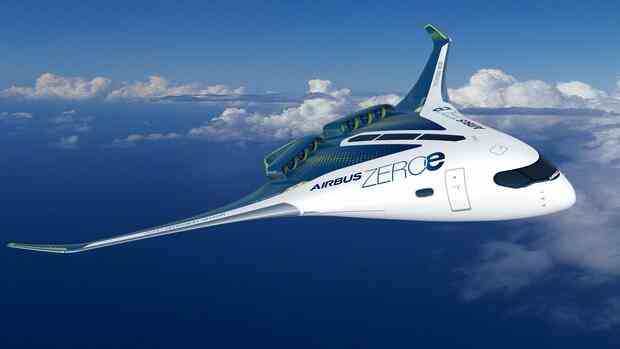The goal is ambitious, so ambitious that some aviation experts consider it an illusion. By 2035, Airbus aims to have a hydrogen-powered aircraft on the market. The European aviation group has now given up the original plan to start directly with a short-haul jet. Now the flagship model should be more the size of a regional jet.
Nevertheless, Airbus sets itself a very tight schedule. Subsidies certainly also drive this ambition. But the fact is: the company’s management is taking on the future of flying.
On the other side of the Atlantic, little has been seen of this so far. Arch-rival Boeing is busy with other problems. Completely new drive concepts are therefore not at the top of the agenda there. Seattle doesn’t even dare to develop a new aircraft with conventional engine technology.
Exactly that could still prove to be fatal – also for Airbus. Progress needs competition. If this is missing, the motivation to push new ideas forward with verve quickly suffers. The past teaches that.
Top jobs of the day
Find the best jobs now and
be notified by email.
Aviation in particular is under enormous pressure to innovate. In recent decades, the major aircraft manufacturers have hardly had the courage to bring really new ideas onto the market. Airplanes have become more efficient. There were also new model series such as the A350, the Boeing Dreamliner or the A380 double-decker, which ended up being moderately successful.
>> Read here: Shift of power in the air – Airbus is losing out to its competitor Boeing
But there only improved engines and partly new materials were installed. Nothing has changed in the basic concept. It was better to pimp existing models like the A320 family or the 737 from Boeing.
Boeing suffers from a lack of innovation
That’s understandable, after all it’s extremely risky to invest many billions in a completely new jet without knowing how successful it will be in the market. Airbus experienced this painfully with the A380.
In addition, the customers, the airlines, like to make the issue of sustainability a big priority. When it comes to aircraft orders worth billions, on the other hand, they attach great importance to investment security and predictability. How much does the aircraft cost to operate, how maintenance-intensive is it – these are questions that play a decisive role in an aircraft order. In case of doubt, the order is placed where the calculation is reliable. Such a calculation is rarely feasible for aircraft with completely new technology.
But Boeing’s current weakness shows just how important innovations are. Modernizing a successful aircraft model over and over again does not work. The 737 short- and medium-haul jet has reached the end of its life cycle.
>> Read about this: Sustainable kerosene is supposed to make aviation greener – but it has its pitfalls
The disaster of two crashes that killed 346 people and the subsequent two-year break ordered by the supervisors should have made those responsible in Seattle realize that it is elementary for the future of a company to face up to the innovation competition.
The problem is the duopoly in the airline industry that has existed for decades. It was only when Airbus announced that it would modernize the A320 family that Boeing reacted by pimping the 737. Conversely, only when Boeing declares that it is developing a successor to its short- and medium-haul jet will Airbus intensify its plans for a new one employ aircraft.
A hydrogen plane is not enough
When it comes to sustainable flying, this competition is more important than ever. Investing in completely new powertrains is a daunting challenge in itself. If there is also no serious competitor breathing down your neck with his innovations and threatening to take away market share, things get difficult.
After all, being the only major aircraft manufacturer to invest billions in a technology for many years to come, of which no one knows if and when it will be able to be used across the board, is ultimately nothing more than a high-stakes bet. This is not so easy to justify to investors when the lenders see that nobody else is doing it.
The problem: time is short, there is no real alternative. It is not only the EU that has set ambitious climate targets for aviation. The industry itself is also under pressure. Relying solely on synthetic fuel for climate-neutral flying will not work. The topic will still pose enormous challenges for the entire industry. A hydrogen plane is not enough, it also has to be refueled and serviced. This requires immense investment by industry and airports. They, in turn, will only take the money into their hands when it is clear where the journey is going.
Despite all the difficulties Boeing has, the US company can no longer hold back on innovations such as hydrogen propulsion. It is neither in the interest of the climate nor of the airlines if Airbus is the only major aviation group to take care of the aircraft of the future.
By the way: Sooner or later, Boeing investors will also go on the barricades when they see that their investment is classified as harmful to the climate.
More: How Lufthansa wants to fly climate-neutral with solar kerosene

